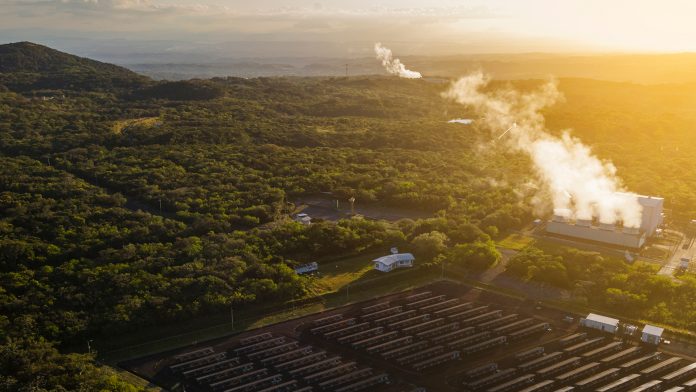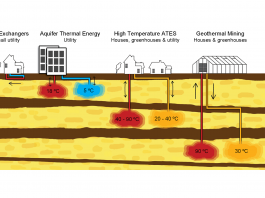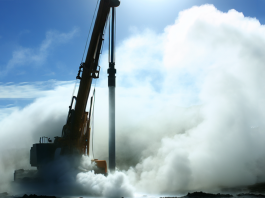A newly published white paper has provided evidence for the deployment and development of deep geothermal energy projects in the UK.
The white paper, ‘The case for deep geothermal energy – unlocking investment at scale in the UK,’ was commissioned by the North East Local Enterprise Partnership to highlight the potential of deploying geothermal energy in the UK.
The document was funded by the Department for Energy Security and Net Zero (DESNZ) and the North East and Yorkshire Net Zero Hub.
The research was led by the British Geological Survey and Arup.
What does the white paper explore?
The white paper has taken into account evidence from the geothermal industry, regulation, finance, and academia. It outlines how deep geothermal energy, energy generated and stored in the form of heat in rocks, groundwater, and soils, can provide a low-carbon source for heating, cooling, and power generation.
This has the potential to support the UK’s net zero targets and provide a domestic form of decentralised energy.
The paper highlights how investment in geothermal energy in the UK could deliver an economic boost to create jobs and tackle fuel poverty across the country.
It then goes on to look at the opportunities, benefits, and potential challenges around the deployment of geothermal energy in the UK, before outlining a set of recommendations to build, scale up, and support the long-term growth of the sector.
What opportunities does geothermal energy offer the UK?
New maps made available by the British Geological Survey show that deep geothermal energy offers decarbonisation opportunities across the UK.
Lucy Winskell, Chair, North East Local Enterprise Partnership, said: “Geothermal energy has one of the lowest carbon footprints compared to other technologies and its availability across the UK means that by connecting it to district heating networks we can deliver a secure, local and flexible baseload technology which can provide for our domestic, commercial and public sector requirements for heat.
“Like Mine Energy, its exploitation has the potential to deliver new jobs and investment into regions of the UK which are central to government’s levelling up agenda.
“As well as helping the UK meet its net zero targets, adopting geothermal energy would bring a host of economic and societal benefits too. Growing the sector will not only lead to job creation, but it provides a unique opportunity to transition roles within the oil and gas sector to grow skills, knowledge and economic activity in domestic low carbon technologies.
“With many of the UK’s potential deep geothermal projects located in areas identified by the UK Community Renewal Fund as in need of economic stimulus, we also have the opportunity to support the levelling up agenda by creating green jobs and addressing fuel poverty.”
Where can the UK’s deep geothermal energy resources be found?
Most of the UK’s onshore deep geothermal energy resources can be found in deep sedimentary basins in large parts of Great Britain and Northern Ireland. Here, water circulates through deep rocks (>500 m) to form hot sedimentary aquifers (HSA) or fractured sedimentary aquifers (a sub-type of HSA).
Temperatures range from 40–60°C, but can reach up to 100°C in some deeper parts.
Another source of deep geothermal energy in the UK is from radiogenic granites. Heat accumulates within the rock to form ‘Hot Dry Rock’ (HDR).
Granites for potential geothermal targets for power and heat production have already been found in Cornwall, North England, Scotland, and Northern Ireland.
Deep geothermal projects in the UK offer great carbon savings
Stakeholder views taken as part of a recent inquiry by the Environmental Audit Committee show that there is widespread agreement on the potential for developing deep geothermal energy in the UK. This is especially for space heating, industrial heating, and agriculture and horticulture heat use.
It is estimated that individual geothermal projects in the UK could achieve total savings of 72,000 tonnes (geothermal heating project) and 700,000 tonnes (geothermal power project) of CO2 equivalent over their estimated thirty-year and fifty-year operational lifetime, respectively.
Geothermal energy could therefore significantly reduce greenhouse gas emissions across the UK due to its low carbon footprint compared to other space and water heating technologies.
The North East is well positioned to demonstrate the potential of geothermal energy in the UK
Colin Bell, Business and Sector Growth Director at the North East Local Enterprise Partnership, said: “The North East has undertaken geothermal research at the regional level for more than 20 years. We have made significant contributions to the UK’s geothermal knowledge, which is why we were asked to oversee this important piece of work. We commissioned the British Geological Survey and Arup to lead the development of the white paper.
“The North East is poised to become the UK’s first low carbon heat cluster, and the geothermal potential means we’re well positioned to demonstrate the commercial viability of deep geothermal heat deployment. As a region we have the expertise, infrastructure and collective ambition to take forward the recommendations in the white paper and lead the proposed demonstrator projects; paving the way for the scalability of deep geothermal across the UK.”
What are the challenges facing geothermal energy deployment?
The white paper also explored some of the potential challenges of deploying geothermal energy in the UK, such as high upfront costs, public awareness and support, and government investment.

Jason Boddy, Associate Director at Arup said: “If we really want to accelerate the use of deep geothermal energy in the UK, we need to address current regulation and drive forward innovation in the sector so we can bring costs down and build confidence amongst investors and the supply chain.
“Improving the availability of data will reduce some of the risks associated with geothermal projects and allows us to identify more opportunities and areas for future developments.”
Recommendations for building the UK’s geothermal energy sector
The paper concludes with a set of recommendations to build the sector over the short, medium, and long term. These include:
- Reviewing financial support for geothermal energy projects;
- Signposting the role of geothermal energy in UK net zero efforts;
- Reviewing the legal status, regulation, and licencing of geothermal energy;
- Improving data availability and accessibility;
- Understanding public perception of geothermal energy; and
- Facilitating communication between stakeholder groups.
Dr Corinna Abesser, Policy Director at the British Geological Society, said: “Geothermal energy provides a unique opportunity to deliver a wide geographical area of the UK with a decentralised, low-carbon energy source via district heating networks.
“This white paper sets out how we can utilise deep geothermal energy to meet our net zero objectives, deliver economic growth across the country, increase our energy security, and improve our communities by creating the green jobs of the future.”
The white paper is intended to complement the mine energy white paper, led and procured by the North East Local Enterprise Partnership during 2020/21 on behalf of the UK Mine Energy Taskforce.









